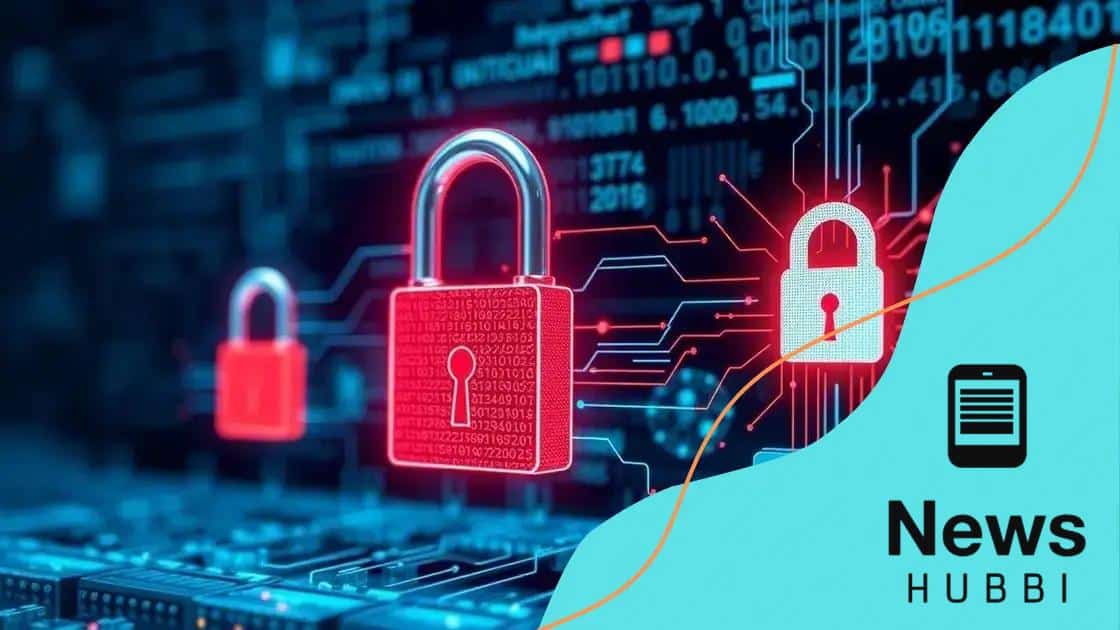The growing role of quantum computing in cybersecurity

Anúncios
The growing role of quantum computing in cybersecurity significantly enhances encryption, strengthens data protection, and introduces new challenges such as high implementation costs and technical complexities for organizations.
The growing role of quantum computing in cybersecurity is an area that promises to reshape our approach to digital security. With emerging technologies, the question arises: how can we safeguard our information in this new era?
Anúncios
Understanding quantum computing
Understanding quantum computing is essential as it becomes a crucial part of our technological landscape. At its core, quantum computing leverages the principles of quantum mechanics to process information in a fundamentally different way than traditional computers.
While classical computers use bits as the smallest unit of data, which can either be a 0 or a 1, quantum computers use qubits. These qubits can exist in multiple states simultaneously, allowing quantum computers to perform complex calculations at speeds unimaginable with classical technology.
The principles of quantum mechanics
Quantum mechanics introduces several unique concepts that are central to the operations of quantum computers:
Anúncios
By exploiting these principles, quantum computing aims to tackle problems that are currently intractable, such as complex simulations in physics, optimization problems, and advanced cryptography.
How quantum computing differs from classical computing
Understanding the differences between quantum and classical computing is vital. For instance, while classical computers rely on sequential processing and limited data handling, quantum computers can perform many calculations simultaneously. This parallel processing capability can speed up problem-solving significantly.
Moreover, quantum algorithms, such as Shor’s algorithm for factoring and Grover’s algorithm for searching databases, demonstrate just how much faster quantum computing can be compared to its classical counterparts.
As we explore further, the intersection of quantum computing and cybersecurity becomes increasingly apparent. With rapid advancements, we are on the brink of a revolution in how we approach data encryption and protection.
How quantum computing enhances encryption
How quantum computing enhances encryption is an important area to explore as it promises to revolutionize data security. The traditional encryption methods we use today, such as RSA and AES, rely on complex mathematical problems that next-generation quantum computers can solve much more quickly.
This power could render current encryption methods obsolete. Quantum computers can break these encryptions by leveraging their ability to handle vast data sets and perform computations at incredible speeds. This realization prompts a need for a new approach.
The development of quantum encryption
One of the key advancements in this field is quantum key distribution (QKD). QKD uses the principles of quantum mechanics to securely share encryption keys. Here’s how it enhances security:
Such features make QKD a promising solution for secure communications, especially for sensitive data exchanges.
Post-quantum cryptography
As we approach the age of quantum computing, researchers are also developing post-quantum cryptography. This involves creating encryption methods that can resist quantum attacks. Some strategies being explored include:
This hybrid approach could help protect our data as quantum technology continues to advance.
Overall, the way quantum computing enhances encryption reflects a significant shift in how we think about cybersecurity. As threats evolve, so must our strategies to protect sensitive information.
The implications for data protection

The implications for data protection in the age of quantum computing are profound. As quantum technology evolves, it has the potential to both threaten and enhance data security. Understanding these implications is critical for businesses and individuals alike.
One major concern is that quantum computers can break many of the current encryption methods used to protect sensitive data. For instance, traditional encryption algorithms, like RSA, rely on the difficulty of factoring large numbers. Quantum computers, however, can leverage algorithms that can accomplish this task with remarkable speed.
Potential risks to data security
As we transition to a more quantum-based technology landscape, several risks become apparent:
With these concerns in mind, it is clear that the implications of quantum computing on data protection are significant.
Advancements in data protection strategies
Despite these risks, quantum computing also presents opportunities for enhanced data protection. Innovations in quantum encryption can provide unprecedented security measures:
The dialogue around data protection in the realm of quantum computing reflects both a challenge and an opportunity. As we adapt to this new frontier, staying informed and proactive is crucial to protecting our digital assets.
Challenges in implementing quantum cybersecurity
Challenges in implementing quantum cybersecurity are significant as organizations consider adopting this advanced technology. While quantum computing offers improved encryption methods, several hurdles must be addressed before it can be widely implemented.
One major challenge is cost. Developing and maintaining quantum networks and systems requires substantial investments in both technology and training. Many organizations may find these costs prohibitive, especially smaller businesses.
Technical complexities
Another challenge lies in the technical complexity of quantum systems. Building a reliable quantum infrastructure presents several issues:
These technical challenges can slow down the transition to quantum cybersecurity solutions.
Regulatory and ethical considerations
As quantum cybersecurity advances, regulatory and ethical considerations also come into play. Organizations must navigate:
The landscape is continually evolving, complicating the establishment of clear guidelines. Despite these challenges, the push towards quantum cybersecurity continues, driven by the need for enhanced protection in a digital world.
The future landscape of cybersecurity with quantum technology
The future landscape of cybersecurity with quantum technology holds great promise as we move forward into an era where digital security evolves alongside advances in quantum computing. This fusion of quantum technology and cybersecurity will change how we protect our sensitive information.
As quantum computers become more capable, they will significantly enhance encryption methods. This shift means that organizations will have access to stronger, more secure protocols to safeguard data. Quantum encryption, such as quantum key distribution (QKD), will provide unprecedented security levels that traditional systems can’t match.
Emerging security strategies
In this rapidly changing landscape, several emerging security strategies will evolve:
These strategies will enhance the ability of organizations to defend against cyber threats more efficiently.
Implications for businesses and individuals
For businesses, the integration of quantum technology into cybersecurity means they must stay ahead of evolving threats. Investing in quantum security solutions will become essential to protect sensitive information and maintain customer trust. Individuals will also need to be aware of these changes, as personal data security will be directly impacted.
Overall, as quantum technology continues to advance, the landscape of cybersecurity will adapt and grow. Organizations and individuals will need to embrace these changes, ensuring they remain protected in a digital age that increasingly depends on quantum solutions.
| Key Takeaways | Details |
|---|---|
| 🔒 Enhanced Security | Quantum technology offers stronger encryption methods. |
| 💰 High Costs | Implementing quantum cybersecurity can be expensive. |
| ⚙️ Technical Challenges | Building reliable quantum systems is complex. |
| 🧩 Integration Issues | Quantum systems must work with existing technology. |
| 🚀 Future Opportunities | New strategies are emerging for secure data exchange. |
FAQ – Frequently Asked Questions about Quantum Computing in Cybersecurity
What are the main benefits of quantum computing in cybersecurity?
Quantum computing enhances cybersecurity by offering stronger encryption methods and faster threat detection capabilities, significantly improving data protection.
What challenges do organizations face when implementing quantum cybersecurity?
Organizations face challenges like high costs, technical complexities, and the need for integration with existing systems, which can slow the transition to quantum security.
How does quantum key distribution (QKD) work?
QKD uses the principles of quantum mechanics to securely share encryption keys, making it nearly impossible for eavesdroppers to intercept communications without detection.
What is post-quantum cryptography?
Post-quantum cryptography involves developing encryption methods that are resistant to potential attacks from quantum computers, ensuring long-term data security.





